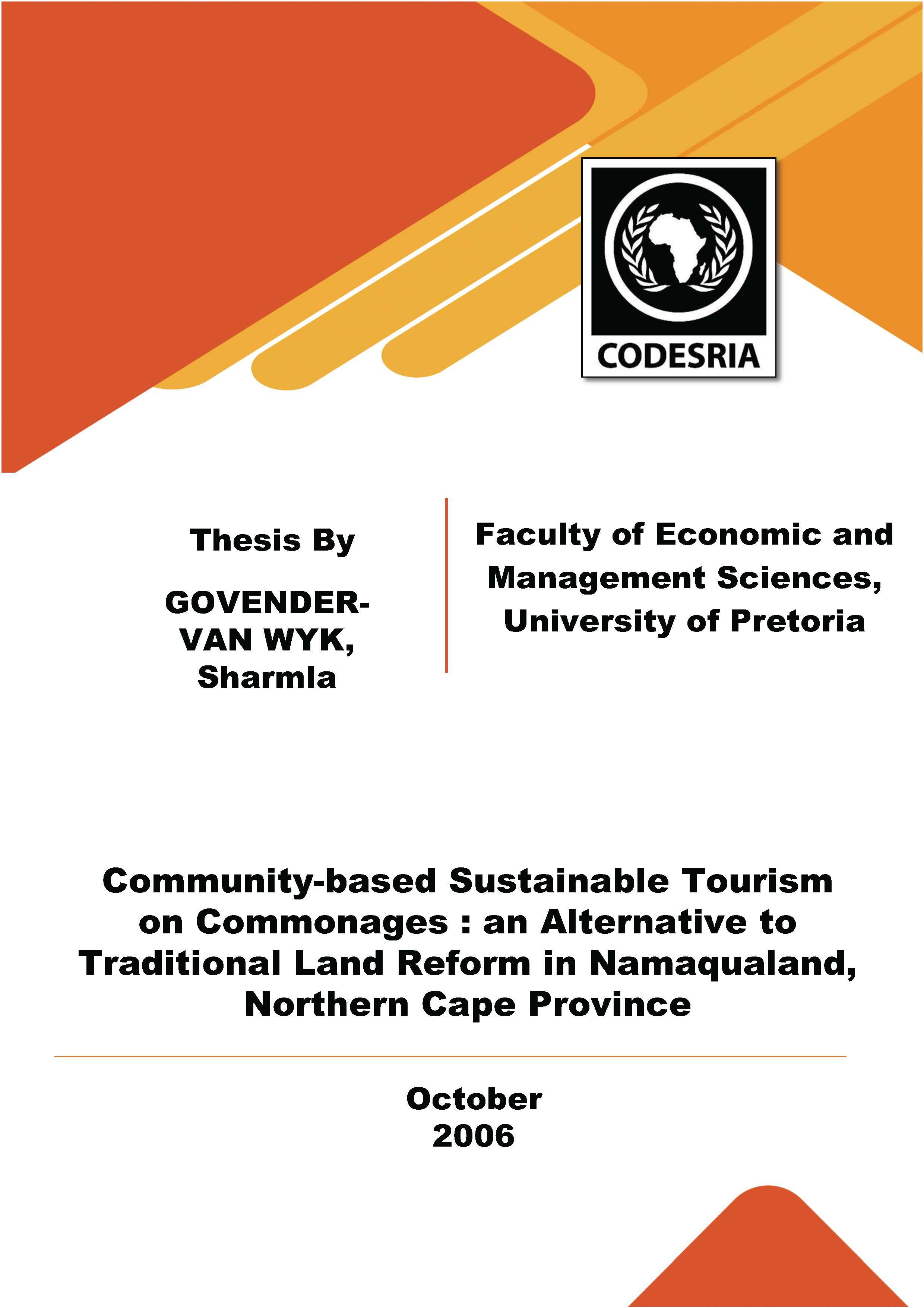Community-based Sustainable Tourism on Commonages : an Alternative to Traditional Land Reform in Namaqualand, Northern Cape Province
Keywords:
Tourism, land reform, sustainable development, land redistribution, sustainable tourism, ecotourism, South Africa, Brazil, Namibia, ZimbabweSynopsis
Since 1994, the South African Government has developed two strategic policies that embrace the principles of sustainable development: Tourism and Land Reform. Both policies seek redress and economic development for previously disadvantaged black people, but both policies were not integrated to form part of a sustainable development strategy for communities. In terms of the land redistribution programme (as one leg of the land reform programme), the commonage sub-programme has primarily advocated an agrarian style development despite the decline in contribution of agriculture to the Gross Domestic Product. By promoting one development option, other livelihood opportunities such as tourism have not been explored. The White Paper on Tourism (1996) has also recognised the limited integration of local communities and previously neglected groups as an impediment to sustainable tourism development in South Africa. The aim of this study is to provide integrated planning guidelines for sustainable tourism development for commonages in Namaqualand. The study poses the question: What role could sustainable tourism play in commonage projects? In an attempt to fulfil the aim of the study and answer the research question, nine objectives were devised to guide the direction of the study. The objectives primarily focussed on conceptualising land redistribution and sustainable tourism through various local and international case studies in order to draw commonalities and identify negative and positive impacts of these approaches. ln so doing, the sustainability of a purely agrarian focus of land reform policies across the global spectrum was brought into question.
Downloads
References
Adams M, 2000, Land Reform in Namibia. [Online] Available from: http://www.oxfam.co.uk [Site accessed 15 December 2005].
Adams Mand Devitt P, 1991, Grappling with land reform in pastoral Namibia, Proceedings of the National Conference on Land Reform, Windhoek, September 1991.
Africa Geographic, 2005, Conservation and community: Ecotourism at Grumeti River Camp, Tanzania, East Africa. [Online] Available from: http://www.ccafrica.com/conservation-1-id-2-14 [Site accessed 15 December 2004].
African Institute for Agrarian Studies, 2004, Overall impact of the fast track land reform programme in Zimbabwe. [Online] Available from: http://www.aiastrust.org/index [Site accessed 24 January 2006].
Ahmed B, 2002, Ecotourism in desert areas in Algeria, Seminar on Sustainable Development of Ecotourism in Desert Areas, World Tourism Organisation, Algiers Algeria, 21-23 January 2002.
Ainslie A, 2002, Cattle ownership and production in the communal areas of the Eastern Cape, South Africa, Programme for Land and Agrarian Studies (Research Report No.10), Cape Town.
Anderson M and Pienaar K, 2003, Land and Agrarian Reform: Municipal Commonage, Programme for Land and Agrarian Studies, University of the Western Cape, Cape Town.
Anseeuw W, 2003, Commercial farming as a new activity in South Africa: An analysis realised during the resettlement phase, lnstitut National de Recherche Agronomique (!NRA), Johannesburg.
Archer F, Turner Sand Venter F, 1996, Range Management, livestock production and nature conservation: the Richtersveld National Park, in: Centre for Development Cooperation (Ed.) Successful natural resource management in Southern Africa, Gamsberg MacMillan Publishers, Windhoek.
Arthington A H, Miller G J and Outridge P M, 1989, Water quality, phosphorous budgets and management of dune lakes used for recreation in Queensland (Australia), Water Science Technology, Number 21, pp.111-118.
Ashley C, 2000, The impacts of tourism on rural livelihoods: Namibia's experience, Working Paper 128, Overseas Development Institute, London.
Ashley C, Boyd C and Goodwin HJ, 2000, Pro-poor tourism: Putting poverty at the heart of the tourism agenda, Natural Resource Perspectives, Number 51, March 2000.
Ashley C, Goodwin H and Roe D, 2001, Pro-poor tourism: Expanding opportunities for the poor, Pro-Poor Tourism Policy Briefing 1, Overseas Development Institute, International Institute for Environment and Development and Centre for Responsible Tourism, London.
Ashley C and Roe D, 1998, Enhancing community involvement in wildlife tourism: Issues and challenges, Wildlife and Development Series No. 11, International Institute for Environment and Development, London.
Atkinson D, 2005, People-centred environmental management and municipal commonage in the Nama Karoo, Commons Southern Africa occasional paper series No. 11, Centre for Applied Social Sciences and Programme for Land and Agrarian Studies, University of the Western Cape.






